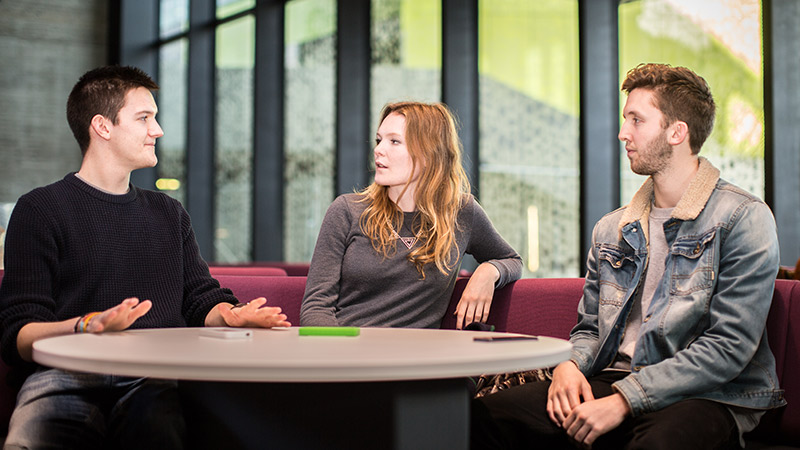Politics
BA (Hons) or BSc (Hons)
Start dates: September 2026
Full time: 3 years
Part time: up to 6 years
Location: Headington
School(s): School of Social Sciences
Overview
Expose the link between people and political power. Our politics degree helps you make sense of an ever-changing world, understand the facts and use them to form coherent, compelling arguments about what’s going on in our times.
You’ll grapple with some of the most pressing issues of the modern era, such as:
- nationalism and populism
- regional politics, e.g. Russia, South Africa, and Europe
- conflict and peacebuilding
- gender equality and racial justice.
Also, you’ll be joining a community where those around you are socially, politically, and environmentally conscious and active.
As this is a joint honours degree, you can study it alongside another discipline of your choice and explore how they overlap. You may combine politics with:
- Communication, Media and Culture
- Criminology
- History
- Philosophy
- Sociology.

Why Oxford Brookes University?
-
The heart of politics
From colonialism to refugee action, Oxford is at the epicentre of modern political debate.
-
Constant support
Our classes are small, meaning you’ll receive the attention and guidance you need.
-
Familiar faces
Develop good working relationships with your tutors – many of whom are active researchers.
-
Relevant topics
The course deals with contemporary political and social issues, like rising nationalism and tensions in Eastern Europe.
-
Stimulating activity
We don’t just assess you with coursework and essays – you’ll get involved with NGO briefings, peace negotiation simulations and reflective diaries.
-
Additional language modules
Our university-wide language programme is available to full-time undergraduate and postgraduate students on many of our courses, and can be taken as a credit on some courses.
Course details
Study modules
Teaching for this course takes place face to face, and you should also anticipate a workload of 1,200 hours per year. Teaching usually takes place Monday to Friday, between 9.00am and 6.00pm.
Contact hours involve activities such as lectures, seminars, practicals, assessments, and academic advising sessions. These hours differ by year of study and typically increase significantly during placements or other types of work-based learning.
Careers
The skills you pick up on this course will come in useful in a variety of settings. This includes government, law, journalism, trade unions, publishing, management, and social work. Or you may look to work with MPs or within political parties.
Our graduates can be found working with:
- The Civil Service Fast Track Programme
- Oxford University Press
- Hestia (charity supporting those who experience domestic abuse)
- The Cherie Blair Foundation for Women.
Our Life After Uni events let you network and have discussions with industry professionals. At our past events, there have been speakers from:
- Humanity and Inclusion
- Right to Play
- Humanitarian Academy for Development
- The Department for Education.
You can also pursue postgraduate study, where you can research an aspect of politics you’re fascinated with on a deeper level. We have masters’ degrees in International Relations and International Security. The former is also available as a distance learning course.
Student profiles
Joint honours options
You can study this course as part of a joint honours degree. This course can be joined with:
Entry requirements
Wherever possible we make our conditional offers using the UCAS Tariff. The combination of A-level grades listed here would be just one way of achieving the UCAS Tariff points for this course.
Standard offer
UCAS Tariff Points: 112 or 120 (dependent on joint honours subjects)
A Level: BBC or BBB (dependent on joint honours subjects) or equivalent
IB Points: 30 or 31 (dependent on joint honours subjects)
BTEC: DMM or DDM (dependent on joint honours subjects)
Contextual offer
UCAS Tariff Points:
A Level:
IB Points:
BTEC:
Further offer details
For joint honours, normally the offer will lie between the offers quoted for each subject.
Applications are also welcomed for consideration from applicants with European qualifications, international qualifications or recognised foundation courses. For advice on eligibility please contact Admissions: admissions@brookes.ac.uk
Specific entry requirements
Please also see the University's general entry requirements.
English language requirements
Please see the University's standard English language requirements.
Pathways courses for international and EU students
If you do not meet the entry requirements for this degree, or if you would like more preparation before you start, you can take an international foundation course. Once you enrol, you will have a guaranteed pathway to this degree if you pass your foundation course with the required grades.
If you only need to meet the language requirements, you can take our pre-sessional English course. You will develop key language and study skills for academic success and you will not need to take an external language test to progress to your degree.
English requirements for visas
If you need a student visa to enter the UK you will need to meet the UK Visas and Immigration minimum language requirements as well as the University's requirements. Find out more about English language requirements.
Credit transfer
Many of our courses consider applications for entry part-way through the course for students who have credit from previous learning or relevant professional experience.
Find out more about transferring to Brookes. If you'd like to talk through your options, please contact our Admissions team.
Terms and conditions of enrolment
When you accept our offer, you agree to the Terms and Conditions of Enrolment. You should therefore read those conditions before accepting the offer.
International qualifications and equivalences
How to apply
Application process
Full time international applicants can also apply through UCAS
Tuition fees
Questions about fees?
Contact Student Finance on:
Tuition fees
Please note, tuition fees for Home students may increase in subsequent years both for new and continuing students in line with an inflationary amount determined by government. Oxford Brookes University intends to maintain its fees for new and returning Home students at the maximum permitted level.
For further information please see our tuition fees FAQs.
Tuition fees for International students may increase in subsequent years both for new and continuing students.
The following factors will be taken into account by the University when it is setting the annual fees: inflationary measures such as the retail price indices, projected increases in University costs, changes in the level of funding received from Government sources, admissions statistics and access considerations including the availability of student support.
How and when to pay
Tuition fee instalments for the semester are due by the Monday of week 1 of each semester. Students are not liable for full fees for that semester if they leave before week 4. If the leaving date is after week 4, full fees for the semester are payable.
- For information on payment methods please see our Make a Payment page.
- For information about refunds please visit our Refund policy page
Additional costs
Please be aware that some courses will involve some additional costs that are not covered by your fees. Specific additional costs for this course are detailed below.
Optional costs
| Additional costs | Amount (£) |
|---|---|
It’s your responsibility to cover print / binding costs where coursework submission is required. Please note that a lot of the coursework is now submitted online. |
From £30 |
| You may choose to purchase books to support your studies. Many books on our reading lists are available via the Library, or can be purchased secondhand. | £20-60 per book |
Accommodation fees in Brookes Letting (most do not include bills) |
£107-301 per week |
Accommodation fees in university halls (bills included, excluding laundry costs) |
£139-248 per week |
Graduation costs include tickets, gowning and photography. Gowns are not compulsory but typically students do hire robes, starting at £41. |
Typically £0-200 |
Students are responsible for their own travel to and from university for classes. For the 2025/26 academic year, the University is introducing an alternative subsidised travel offer for all students with further information on our Travel webpages. |
From £10 |
Funding your studies
Financial support and scholarships
Featured funding opportunities available for this course.
All financial support and scholarships
Programme changes:
On rare occasions we may need to make changes to our course programmes after they have been
published on the website. For more information, please visit our
changes to programmes page.

